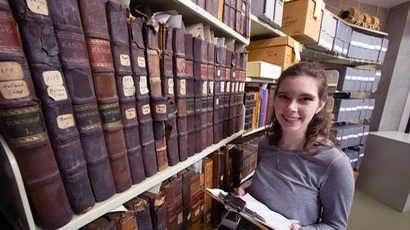
Articles & Book Chapters, 2006-2010
John Charles Arnold, “The Revelatio ecclesiae de Sancti Michaelis and the Mediterranean Origins of Mont Saint-Michel,” The Heroic Age, Issue 10 “Saints and Sanctity” (May 2007).
Steven Fabian, "Curing the Cancer of the Colony: Bagamoyo, Dar es Salaam and Socioeconomic Struggle in German East Africa, 1860s-1907" International Journal of African Historical Studies (40:3) 2007.
Xin Fan, "Gu Jiegang and the Creation of Chinese Historical Geography," Chinese Historical Review 17 (Fall 2010) 2: 193-218.
Nancy Hagedorn, “’With the air and Gesture of an Orator’: Council Oratory, Translation, and Cultural Mediation during Anglo-Iroquois Treaty Conferences, 1690-1774.” In New Trends in Translation and Cultural Identity, edited by Micaela Muñoz-Calvo, Carmen Buesa-Gómez, and M. Ángeles Ruiz-Moneva. Cambridge Scholars Publishing, 2008.
Jennifer Hildebrand, “The New Negro Movement in Lincoln, Nebraska,” Nebraska History, 91:3 & 4, (Fall/Winter 2010), 166-189.
Jennifer Hildebrand, “Two Souls, Two Thoughts, Two Unreconciled Strivings’: The Sound of Double Consciousness in Roland Hayes’s Early Career,” Black Music Research Journal 30:2 (Fall 2010) 273-302.
Jennifer Hildebrand, “‘I awluz liked dead people, en done all I could for ‘em’: Reconsidering Huckleberry Finn’s African and American Identity,” The Southern Quarterly (Special Issue, “Dialogues of the Dead: Atlantic Crosscurrents) 47:4 (Summer 2010), 151-190.
Jennifer Hildebrand, “Uncovering the True Relationship between Masters and Slaves” in Dixie Ray Haggard, ed., African Americans in the Nineteenth Century: Perspectives in American Social History (Santa Barbara, CA: ABC- CLIO, 2010), 63-78.
Jennifer Hildebrand, “Dere were no place in heaven for him an’ he were not desired in hell’: Igbo Cultural Beliefs in Black Folk Expressions,” Journal of African American History v. 91 n. 2 (Spring 2006), 127-152.
David Kinkela, “The Ecological Landscapes of Rachel Carson and Jane Jacobs,” American Quarterly 61:4, (Winter, 2009): 905-28.
Ellen Litwicki, “The Influence of Commerce, Technology, and Race on Popular Culture in the Gilded Age.” In The Gilded Age: Perspectives on the Origins of Modern America, ed. Charles Calhoun, 2nd
Ellen Litwicki, “‘Agitate, Educate, Organize’: Labor Day in America.” In Encyclopedia of American Holidays and National Days, 2 vols., ed. Len Travers, 333-63. Greenwood Press, 2006.
Peter McCord, “Divergences on the Left: The Environmentalisms of Rachel Carson and Murray Bookchin,” Left History, Issue 13, Volume 1, Spring/Summer 2008.
Eric Meringer, "The local politics of indigenous self-representation: intraethnic political division among Nicaragua's Miskito people during the Sandanista era." Oral History Review, 37, no. 1 (2010): 1-17.
Mary Beth Sievens, “Productive Confusion: Using a Quasi-Legal Source in a Women’s History Classroom,” Journal of Women’s History Vol. 22, No. 2 (Summer 2010): 162-165.
Mary Beth Sievens, “Female Consumerism and Household Authority in Early National New England,” Early American Studies Vol. 4, No. 2 (Fall 2006): 353-371.
John R. Staples, “Putting 'Russia' Back into Russian Mennonite History: The Crimean War, Emancipation, and the Molochna Mennonite Landlessness Crisis,” Mennonite Life 62:1 (2007).
John R. Staples, “The Mennonite Commonwealth Paradigm and the Dnepropetrovsk School of Ukrainian Mennonite Historiography.” Voprosy Germanskoi Istorii (2007).
John R. Staples, “Johann Cornies, Money-Lending, and Modernization in the Molochna Mennonite Settlement, 1820s-1840s, Journal of Mennonite Studies 27 (2009), 109-128.
Emily Straus, “Creating a Middle-Income Cooperative Community: Penn South and the Redevelopment of Manhattan’s Chelsea Neighborhood” New York History 91, no. 3(Summer 2010): 197-219.
Emily Straus, “Unequal Pieces of a Shrinking Pie: The Struggle between African Americans and Latinos over Education, Employment, and Empowerment in Compton, California” History of Education Quarterly 49, no. 4 (Nov. 2009): 507-529.
Jacqueline Swansinger, “Preparing Student Teachers for a World History Curriculum in New York”, The History Teacher, Vol 43 (1) November 2009, pp. 87-96.
Markus Vink, “A Mediterranean world-economy? The Arabian Seas in the 18th century”, The Mariner’s Mirror 96:4 (2010), pp. 493-500.
Markus Vink, “Freedom and slavery: The Dutch Republic, the VOC world, and the debate over the ‘world’s oldest trade’”, South African Historical Journal 59 (2007), pp. 19-46.
Markus Vink, “A work of compassion? The Dutch slavery debate in the seventeenth century,” in: Nigel Worden ed., Contingent lives: Social identity and material culture in the VOC world. Cape Town: University of Cape Town Press, 2007, pp. 463-499.
Markus Vink, (with Jean Taylor, Heather Sutherland, and Robert Ross), “Comparisons and ways forward,” in: Nigel Worden ed., Contingent lives: Social identity and material culture in the VOC world. Cape Town: University of Cape Town Press, 2007, pp. 602-612.
Markus Vink, “Indian Ocean studies and the ‘new thalassology,’” Journal of Global History 2:1 (2007), pp. 41-62.
Markus Vink, “Between profit and power: The Dutch East India Company and institutional early modernities in the age of mercantilism,” in: Charles H. Parker and Jerry H. Bentley eds., Between the Middle Ages and modernity: Individual and community in the early modern world. New York, NY: Rowman and Littlefield, 2007, pp. 285-306.
